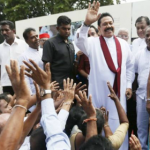There are no winners in the political crisis in Sri Lanka. President Maithripala Sirisena, whose actions triggered the crisis, Mahinda Rajapaksa, who as Prime Minister lost two confidence votes, and Ranil Wickremesinghe, former Prime Minister who enjoys majority support in Parliament, are locked in a draw.
A ringside view
Against this backdrop, what are the perceptions among the main political actors, which impact Sri Lanka-India relations? A delegation of eminent Indian scholars, former civil servants and a retired navy chief, led by Lalit Mansingh, former Foreign Secretary and chairman of the Kalinga Lanka Foundation (KLF), was in Colombo last month. The delegation’s candid discussions with four leading think tanks and numerous key players on different sides of the political divide provided a ringside view of the situation.
Cutting across party lines, a clear bipartisan consensus emerged about Sri Lanka’s continuing need to nurture a positive engagement with India. Prime Minister Narendra Modi’s initiatives to improve the relationship evoked appreciation. But given the asymmetries in size and power, Sri Lanka finds itself overwhelmed by India’s presence. Hence, resisting India’s overtures for closer cooperation may be seen as part of Sri Lanka’s assertion of its independent identity.
From the Sri Lankan perspective, cultivating China as a counter to India makes strategic sense. The country needs huge capital for its development. China seems to be the only source willing to provide it, albeit on increasingly tougher terms. Many Sri Lankan intellectuals and policymakers reject the notion of a Chinese ‘debt trap’ and criticism of the 99-year lease given to China for Hambantota Port as ‘neo-colonial’. They argue that they would accept Chinese money, but refuse to embrace China’s presence. Rather unconvincingly, they claim expertise in knowing and dealing with China.
On India-China rivalry, pro-Rajapaksa interlocutors sought a balance in Sri Lanka’s ties with the two Asian powers. A strong, though unrealistic, plea was made suggesting that China-Sri Lanka relations should not be seen from the narrow prism of the complex relations between India and China. They advanced two additional arguments: one, for most projects Colombo had approached India initially and turned to China only later; two, ‘China delivers, while Indian bureaucracy delays’ was a constant refrain.
It appears Sri Lanka may be turning away from its identity as a South Asian nation to assert its role as an Indian Ocean country, imbued with an ambition to connect better with ASEAN and Japan. Discontent over the impasse in SAARC and challenges in strengthening the Bay of Bengal Initiative for Multi-Sectoral Technical and Economic Cooperation are behind this shift. Economic opportunities that could result from better international maritime connectivity and the potential of the blue economy are other motivations. Concerning the Indian Ocean, Colombo clamours for India’s collaboration in its efforts to turn the region into one of peace and harmony. Some express support for reviving the trilateral maritime cooperation among India, Sri Lanka and the Maldives. Others believe that India and China must cooperate for the region’s benefit.
Economic issues
On economic cooperation with India, Mr. Wikremesinghe has been more upbeat than the President or Mr. Rajapaksa. In retrospect, one of the triggers for the crisis was his insistence to move ahead with projects identified in the MoU signed with India in April 2017 that had Mr. Sirisena’s opposition. Mr. Wikremesinghe, on a recent visit to Delhi, sought to transfer Mr. Modi’s concern over delays in project implementation to Mr. Sirisena. Besides, Mr. Wikremesinghe’s apparent refusal to take seriously Mr. Sirisena’s anxiety over reports of an attempt on his life brought the two to the breaking point.
The KLF delegation heard how the Sri Lankan industry feared being flooded by Indian goods and professionals. The Economic and Technology Cooperation Agreement is yet to reach finalisation. Assessment in Colombo is that Indian investors prefer to invest at home; hence Sri Lanka’s push to attract new investments from Southeast Asia and beyond. The point, however, is that all investors will be risk-averse when the country is unstable and politically fractured. The Sri Lankan Tamil view continues to be supportive of a proactive policy stance by India.
India encounters a range of reactions in Sri Lanka: appreciation, support, suspicion and opposition. Indian diplomacy plays on a sticky wicket. New Delhi is committed to refraining from interference in a neighbour’s internal affairs, but it will always defend its vital interests. While being fair to all sides, it is closely monitoring the unfolding crisis.
Rajiv Bhatia is Distinguished Fellow, Gateway House and former Ambassador to Myanmar
This article was originally published by The Hindu. Click here to view the original article.


